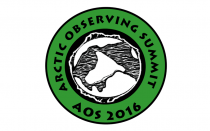
The Arctic Observing Summit 2016, which was held in Fairbanks in March, has just released their conference statement which identifies the need for a united circum-polar monitoring network. Specifically seven major recommendations were elucidated:
1. Develop international principles and protocols that establish ethical guidelines for research, for the involvement of Arctic Indigenous Knowledge holders, for the use of Indigenous Knowledge and the co production of knowledge. Develop mechanisms to enable collaborative approaches and building of trust among partners, such as researchers, Indigenous Peoples, private sector entities and others, to define observational needs, and to plan, prioritize, implement, and use sustained observations.
2. Propose to the highest levels of government, the business case for a comprehensive pan-Arctic observing system. This proposal should assess the costs and demonstrate the benefits for society at various levels, including an Implementation Plan that builds upon the present system and past planning, and that identifies needed resources including infrastructure, instrumentation, human capacity, the pathways to financing, and a strategy for sustained financing.
3. Create opportunities for stakeholder engagement as a critical component of an effective pan-Arctic observing system that includes strategies for improved communication, takes advantage of existing natural capital, creates avenues for research collaboration, identifies resources for capacity building and participation of local and Indigenous knowledge holders, and resolves jurisdictional, regulation and policy hindrances to active participation.
4. Coordinate the implementation of a pan-Arctic observing system with regional and global observing initiatives, and organize efforts in securing resources for its sustained operation through the leadership of the Sustaining Arctic Observing Networks (SAON) initiative.
5. Advance a strategy for international funding, ideally with a single application and review process and contributions of resources from all partner countries, along with established national support mechanisms. Full implementation of a pan-Arctic Observing System requires coordination of funding efforts to support a globally connected and internationally accessible network.
6. Prioritize, on an ongoing basis, observations that should be started and maintained over the long-term by operational and other relevant agencies. Collaborative, sustained observations need to be implemented through a combined research-operational system that extends across all scales relevant to those it serves, making use of both long-term national/institutional funding and of project based competitive funding.
7. Work, through the IASC-SAON Arctic Data Committee, to develop a broad, globally connected Arctic observing data and information system of systems that is based on open access data and standards, in addition to recognizing and addressing ethical use and proprietary rights of Indigenous Knowledge and that delivers value to Arctic and global communities.


